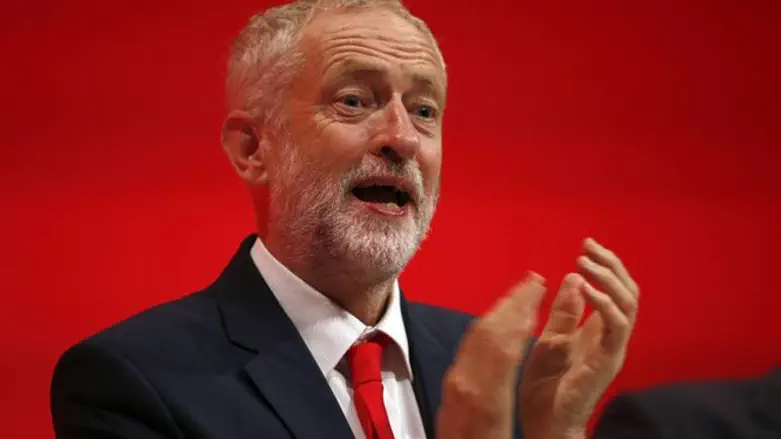
Leading British Jewish journalist Jonathan Freedland wrote on Saturday that the thought of Labour leader Jeremy Corbyn as prime minister strikes a fear among the majority of the British-Jewish community “that we have not known before.”
Britain’s Jews “for the first time in their history, have concluded that someone hostile to them is on the brink of taking democratic power. Yes, of course, not every single British Jew holds that view. But the most recent poll found that 87% regard Corbyn as an anti-Semite, meaning an anti-Jewish racist,” Freedland wrote in a column in The Guardian.
“Why? The recitation is now wearily familiar. Recall that Corbyn’s first reaction on hearing of a plan to remove a mural filled with hideous caricatures of hook-nosed Jewish bankers was to ask, ‘Why?’ Or that he decided to challenge two ‘Zionists’ not on their arguments but by suggesting that, though they ‘might have lived in this country for a very long time’, they “don’t understand English irony’. Or that, when a Palestinian Islamist preacher was found by a British tribunal to have peddled the medieval and lethal myth of Jews feasting on the blood of gentile children, Corbyn declared that man a very ‘honored citizen’, and invited him for tea in the House of Commons. (And those are merely some of the greatest hits; the full discography runs much longer.),” continued Freedland as he listed some of the anti-Semitic incidents during Corbyn’s time as Labour leader.
“For four years, Britain’s Jews have – naively, perhaps – waited for the moment when one of these revelations would prove too much for the Labour faithful, shocking them into action. Perhaps it would be the discovery that, despite evidence against hundreds of party members – including those trafficking in grotesque neo-Nazi imagery and Holocaust denial – only a handful have actually been expelled. Or maybe it would be the BBC Panorama investigation that showed how Corbyn’s team repeatedly interfered in anti-Semitism cases as they went through a supposedly independent disciplinary process, ‘mainly so they could let their mates off the charge’, as one whistleblower, driven to the brink of suicide, put it. Or perhaps it would be the fact that Labour has become only the second political party ever to be investigated for institutional racism by the Equalities and Human Rights Commission (the other was the BNP),” he wrote.
However, Freedland pointed out, “No revelation has ever proved shocking enough that it couldn’t be explained away by those who’d rather not see it. So publicly Labour’s luminaries insist they are fighting a ‘ruthless’ fight against anti-Semitism, doing all the Jewish community has asked of them, as John McDonnell said this week, even though the facts point the other way.”
He also wrote that “plenty advise Jews to shelve their angst in return for a government that will stop Brexit (Jews are overwhelmingly pro-remain). In effect, Jews and their would-be allies are being told that some racism is, if not quite acceptable, then a price worth paying. That seems to have been the bargain struck with those Labour ‘moderates’ who were once so admirably vocal in their denunciation of the leadership on this issue and who are now – minus Tom Watson – knocking on doors to put Corbyn in No 10: you’ve got your second referendum, now shut up about the Jews. It’s an uncomfortable feeling, to be part of a small community that can be so quickly cast aside for the supposed greater good.”
Freedland referred to last Sunday’s headline in the Telegraph which suggested that Jews would leave Britain if Corbyn is elected Prime Minister. He opined that “most Jews would not leave the country. But that the question is even in the air, that someone who sees Jews as not quite ‘us’ – ‘they don’t understand English irony’ – is deemed eligible to be prime minister, makes our presence here feel conditional and shaky. And, whether Corbyn makes it to Downing Street or not, to realize that the historic party of social justice in this country finds a little bit of racism acceptable for the sake of the larger cause, and that many millions of voters agree – well, that realization contains its own heartbreak. It means that what we thought about this country wasn’t quite true.”
“I understand that to many, all this will sound overwrought. I’m afraid that Jewish history has made us that way, prone to imagining the worst. We look at our usually sparse family trees and we can pick out the pessimists, those who panicked and got out. It was they who left their mark on us. You see, the optimists, those who assumed things would work out for the best, they never made it out in time,” he concluded.
Corbyn, who took control of the Labour Party in 2015, has faced ongoing accusations of anti-Semitism, both over his history of hostility towards Israel and support for anti-Israel terrorist groups, as well as the rise in anti-Jewish rhetoric within the party.
Critics, including the Labour Party’s Jewish Labour Movement, have accused Corbyn of suppressing investigations into Labour members accused of anti-Semitism.
Last week, Corbyn tried to reassure Jewish voters in Britain that they have nothing to fear from a possible Labour government.
“Anti-Semitism and racism is an evil within our society,” Corbyn told The Guardian. “We want this country to be safe for all people. An attack on a synagogue, an attack on a mosque, an attack on a church – an attack on a person walking down the street because they’re perceived to be different from the rest of us – we simply can’t tolerate it.”